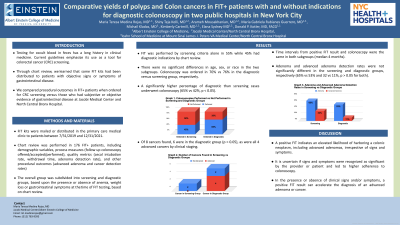Back


Poster Session A - Sunday Afternoon
Category: Colorectal Cancer Prevention
A0174 - Comparative Yields of Polyps and Cancers in FIT+ Patients With and Without Indications for Diagnostic Colonoscopy in Two Public Hospitals in New York City
Sunday, October 23, 2022
5:00 PM – 7:00 PM ET
Location: Crown Ballroom

Has Audio

Maria Teresa Medina Rojas, MD
Jacobi Medical Center
New York, NY
Presenting Author(s)
Maria Teresa Medina Rojas, MD1, Shiny Teja Kolli, MD2, Arameh Mousakhanian, MD2, Maria Gabriela Rubianes Guerrero, MD1, Michail Kladas, MD2, Kimberly Cartmill, MD1, Elana Sydney, MD1, Donald P. Kotler, MD1
1Jacobi Medical Center, Bronx, NY; 2North Central Bronx, Bronx, NY
Introduction: Testing for occult blood in feces has a long history in clinical medicine. Current guidelines emphasize its use as a tool for colorectal cancer (CRC) screening. During pilot studies, we learned that some FIT kits had been distributed to patients with objective signs or symptoms of gastrointestinal disease. We compared the procedural outcomes of patients who had a positive FIT when ordered for CRC screening versus those who had subjective or objective evidence of gastrointestinal disease at Jacobi Medical Center and North Central Bronx Hospital.
Methods: FIT kits were mailed or distributed in the primary care medical clinic to patients between 7/31/2019 and 12/31/2021. In 176 patients with positive FIT results, chart review including demographic variables, process measures such as follow up colonoscopy, quality metrics, and procedural outcomes. The overall group was subdivided into screening and diagnostic groups, based upon the presence or absence of anemia, weight loss or gastrointestinal symptoms at the time of FIT testing, based on chart review.
Results: FIT was performed by screening criteria alone in 55% while 45% had diagnostic indications. There were no significant differences in age, sex, or race in the two subgroups. Colonoscopy was ordered in 70% vs 76% in the diagnostic versus screening group, respectively. Of the exams ordered, a significantly higher percentage of diagnostic than screening cases underwent colonoscopy (65% vs 42%, p< 0.05). Of 8 cancers found, 6 were in the diagnostic group (p >0.05), as were all 4 advanced cancers by clinical staging. Time intervals from positive FIT result and colonoscopy were the same in both subgroups (median 4 months). Adenoma and advanced adenoma detection rates were not significantly different in the screening and diagnostic groups, respectively (65% vs 53% and 32 vs 11%, p >0.05 for both).
Discussion: A positive FIT indicates an elevated likelihood of harboring a colonic neoplasm, including advanced adenomas, irrespective of signs and symptoms. It is uncertain if signs and symptoms were recognized as significant by the provider or patient and led to higher adherence to colonoscopy. In the presence or absence of clinical signs and/or symptoms, a positive FIT result can accelerate the diagnosis of an advanced adenoma or cancer.
Disclosures:
Maria Teresa Medina Rojas, MD1, Shiny Teja Kolli, MD2, Arameh Mousakhanian, MD2, Maria Gabriela Rubianes Guerrero, MD1, Michail Kladas, MD2, Kimberly Cartmill, MD1, Elana Sydney, MD1, Donald P. Kotler, MD1. A0174 - Comparative Yields of Polyps and Cancers in FIT+ Patients With and Without Indications for Diagnostic Colonoscopy in Two Public Hospitals in New York City, ACG 2022 Annual Scientific Meeting Abstracts. Charlotte, NC: American College of Gastroenterology.
1Jacobi Medical Center, Bronx, NY; 2North Central Bronx, Bronx, NY
Introduction: Testing for occult blood in feces has a long history in clinical medicine. Current guidelines emphasize its use as a tool for colorectal cancer (CRC) screening. During pilot studies, we learned that some FIT kits had been distributed to patients with objective signs or symptoms of gastrointestinal disease. We compared the procedural outcomes of patients who had a positive FIT when ordered for CRC screening versus those who had subjective or objective evidence of gastrointestinal disease at Jacobi Medical Center and North Central Bronx Hospital.
Methods: FIT kits were mailed or distributed in the primary care medical clinic to patients between 7/31/2019 and 12/31/2021. In 176 patients with positive FIT results, chart review including demographic variables, process measures such as follow up colonoscopy, quality metrics, and procedural outcomes. The overall group was subdivided into screening and diagnostic groups, based upon the presence or absence of anemia, weight loss or gastrointestinal symptoms at the time of FIT testing, based on chart review.
Results: FIT was performed by screening criteria alone in 55% while 45% had diagnostic indications. There were no significant differences in age, sex, or race in the two subgroups. Colonoscopy was ordered in 70% vs 76% in the diagnostic versus screening group, respectively. Of the exams ordered, a significantly higher percentage of diagnostic than screening cases underwent colonoscopy (65% vs 42%, p< 0.05). Of 8 cancers found, 6 were in the diagnostic group (p >0.05), as were all 4 advanced cancers by clinical staging. Time intervals from positive FIT result and colonoscopy were the same in both subgroups (median 4 months). Adenoma and advanced adenoma detection rates were not significantly different in the screening and diagnostic groups, respectively (65% vs 53% and 32 vs 11%, p >0.05 for both).
Discussion: A positive FIT indicates an elevated likelihood of harboring a colonic neoplasm, including advanced adenomas, irrespective of signs and symptoms. It is uncertain if signs and symptoms were recognized as significant by the provider or patient and led to higher adherence to colonoscopy. In the presence or absence of clinical signs and/or symptoms, a positive FIT result can accelerate the diagnosis of an advanced adenoma or cancer.
Disclosures:
Maria Teresa Medina Rojas indicated no relevant financial relationships.
Shiny Teja Kolli indicated no relevant financial relationships.
Arameh Mousakhanian indicated no relevant financial relationships.
Maria Gabriela Rubianes Guerrero indicated no relevant financial relationships.
Michail Kladas indicated no relevant financial relationships.
Kimberly Cartmill indicated no relevant financial relationships.
Elana Sydney indicated no relevant financial relationships.
Donald Kotler indicated no relevant financial relationships.
Maria Teresa Medina Rojas, MD1, Shiny Teja Kolli, MD2, Arameh Mousakhanian, MD2, Maria Gabriela Rubianes Guerrero, MD1, Michail Kladas, MD2, Kimberly Cartmill, MD1, Elana Sydney, MD1, Donald P. Kotler, MD1. A0174 - Comparative Yields of Polyps and Cancers in FIT+ Patients With and Without Indications for Diagnostic Colonoscopy in Two Public Hospitals in New York City, ACG 2022 Annual Scientific Meeting Abstracts. Charlotte, NC: American College of Gastroenterology.
